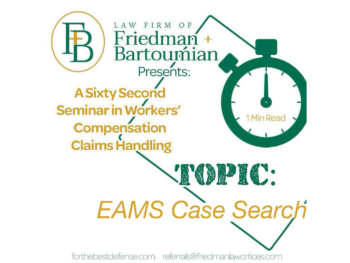#11 FORMING COMPANY TEAMS
Sponsoring Company Teams Can Lead to Workers’ Comp Liability If an Employee Becomes Injured Even Though Participation is Voluntary.
Most employers are often aware that injuries occurring during an off-duty social, recreational or athletic activity are usually non-compensable. However, liability may apply when an employer generously offers to sponsor an employee athletic team by purchasing bowling shirts or baseball jerseys for its employees. Does it make a difference under the law regarding compensability if a bowling shirt or baseball jersey advertises the name of the company? You bet it does. The courts have found that advertising provides a benefit to the employer and thus, injuries to employees participating in such events may be compensable under workers’ compensation law.
#10 THROWING A COMPANY PICNIC
Be Aware That Injuries Occurring at the Company Picnic During Paid Work Hours Are Compensable.
On a warm spring or summer day a company may close early to treat its employees to an afternoon picnic. Usually management offers employees an option of staying behind or going to the picnic, and of course, there are always few who choose to remain behind and work. But for those who opt for the picnic they are usually treated to camaraderie, food, games and a whole lot of fun. Unfortunately, the law punishes employers for having a picnic. Under this scenario where a company closes early injuries occurring during a picnic are deemed compensable under workers’ compensation law. Employees were given a choice of assignments to either stay behind or go on a picnic. No matter their selection they continue to remain on-duty and draw a salary. Thus any injury occurring at a picnic, whether diving to the ground to return a volleyball serve or sliding into second base on the softball field, is deemed fully compensable under the compensation statutes. Because employees are being paid any injury becomes a work-related incident.
#9 HIRING TEMPORARY WORKERS FROM AN EMPLOYMENT AGENCY
Verify the temporary agency has a current workers’ compensation policy in force for their employees.
Sometimes the workload at a company becomes so great that there simply is not enough employees to do the job. To remedy the situation temporary employees from a local employment agency may be hired. Workers’ compensation law is very clear about a company’s liability towards temporary workers should an industrial injury occur. Although the employment agency itself is the general employer and primarily responsible to provide workers’ compensation benefits, the law now requires the special employer (the client) to also provide coverage under their workers’ compensation program if the general employer fails to do so. Effective 1/1/2015 assembly bill 728 (codified under LC 2810.3) became law. It states that if a temporary employment agency does not pay wages to its employees or fails to carry workers’ compensation insurance then the special employer is liable for the employee’s salary and workers’ compensation benefits. The lesson to be learned here is to be careful when hiring temporary workers to avoid being held legally liable to provide wages and workers’ compensation benefits to employees of another company.
#8 HIRING EMPLOYEES FOR A SINGLE ASSIGNMENT ONLY
This is a discouraged practice unless you are left with no option because far too many elderly employees simply wish to retire on workers’ comp insurance.
Often in a labor union environment a company is required to hire from the union hall when employees are needed for special assignments. The duration of any such assignment may be for a short period of time, such as a week or a month. Because we are dealing with a union shop, hiring union workers is required. Every labor union has a sign-up list where unemployed members can register for work. When jobs become available those next on the list get called. It is not the best hiring practice out there but is required nonetheless by the collective bargaining agreement. A problem that many employers face under this scenario is that workers on the union’s unemployment lists are often at the end of their careers. They are looking for one last assignment before retirement. Upon completion of that assignment they file a workers’ compensation cumulative trauma claim against their last employer, alleging a variety of injuries. The stress and strain of work has taken its toll on their body over the years. But so has age. Their knees, back, shoulders, and joints are not what they used to be. Despite the fact these workers are now 65-years or older, they assert that the reason their bodies are now falling apart is solely attributed to all the work they have done over the years. Under California workers’ compensation law an employee may only seek compensation against the employers he has been employed by over the past calendar year. Those employers are responsible for the entire workers’ compensation claim. For example, an employer who hired the employee out of the union hall for a one-month assignment may be held liable for all the worker’s medical complaints attributed to a lifetime of employment. This simply is not fair but it is the law and demonstrates a real and actual danger of being forced to hire out of the union hall.
#7 PAYING FULL SALARY IN LIEU OF TEMPORARY DISABILITY
Offer the Employee the Option of Full Salary or Temporary Disability.
Although rare, some companies do voluntarily pay full salary to its employees in lieu of temporary disability (TD) compensation benefits. We are not talking about LC 4850 benefits available to public safety officers when full salary up to one year is required by law, but instead this topic concerns true voluntary payment of full salary. Payment of full salary in lieu of TD often occurs when a high ranking company officer is injured. However, workers’ compensation law requires the employer to provide an explanation to the employee whenever full salary is paid in lieu of TD. The employee must be expressly told that payment is being made in lieu of workers’ compensation disability with the employee being given the opportunity to decline if so desired. Otherwise, the Workers’ Compensation Appeals Board may interpret the payment of full salary as a gift and may order payment of temporary disability compensation over the period of absence, resulting in both full salary and compensation being paid to the employee.
#6 CONDUCTING EMPLOYEE BACKGROUND CHECKS
It is Illegal to Check a Job Applicant’s History of Workers’ Compensation Injuries.
It goes without saying that conducting a background check before offering employment to a job applicant is a normal and standard business practice in today’s work environment. After all, no company wants to hire someone who is a fugitive from justice or with a nefarious background. Employers normally conduct a thorough investigation into all aspects of a job applicant’s background except for one area … workers’ compensation. In California it is illegal to consider a job applicant’s workers’ compensation claims history prior to offering employment. The fact that a job applicant may have filed 10 workers’ compensation litigated claims against 10 prior employers is immaterial according to the law. Simply put, certain people are known to be “professional claimants.” Their method of operation is to obtain a job, file a workers’ compensation claim for a cumulative trauma injury, and collect as much disability as possible. It is not uncommon to see these individuals receive hundreds of thousands of dollars in disability benefits over a lifetime. What’s ironic is that every year our California legislature tackles the problem of increased costs in the workers’ compensation system, and yet employers are prohibited from conducting a simple background check into a job applicant’s claims history to weed out those who chronically abuse the system.



 The Top 18 Ways Workers’ Compensation Law Punishes Employers for Doing the Right Thing! (Part 3)
The Top 18 Ways Workers’ Compensation Law Punishes Employers for Doing the Right Thing! (Part 3)
Leave a Reply